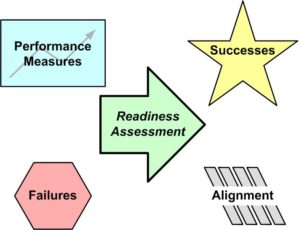Get a Great Start On Next Year from Your Review of Last Year
As the calendar year draws to a close in December, you’ll probably find yourself getting into review mode. If December is also the end of your fiscal year, the review will likely be pretty structured and include financials, operating measures, and organizational and personal objectives. Even if it’s not the end of your fiscal year, you may very well find yourself in a reflective mood and engaged in some kind of informal assessment of 2017. It’s the mood of the season. What did we accomplish? What have we learned? What do we want to change in 2018?
Go with the Flow: Even though our schedule is especially tight during the holidays, December and January are excellent months to plan for and undertake a structured review of performance, for several reasons:
- For many organizations, it is the end of a fiscal year. For those with a July-June fiscal year, it is the half-way point. And for most of the rest with a fiscal year ending in September, it is the end of the first quarter, which is a great time to pause and assess how the new fiscal year has started. There is still time to make adjustments.
- Even if it is not the end of your fiscal year, it is the end of it for many other organizations. That means those organizations will be rolling out new initiatives and making subtle, or not so subtle, shifts in focus. The first quarter of the calendar year can be a period of significant change in your market and in your industry.
- In December, many associations and research organizations release “year in review” reports and “annual forecasts” for the new year, providing an annual spike in fresh industry and market information.
A Balanced Review: So the timing is right. But what should you include in your year-end review? Apart from the obvious financial and operating performance measures and objectives, most organizations readily take stock of accomplishments. And that’s a good idea. However, take a look at failures as well. What tactics were abandoned, becouse they did not turn out to be as important as originally thought, or they just weren’t feasible? What strategies failed? And most importantly, what did we learn from these failures? Did you conduct any kind of Lessons Learned review? If not, it’s probably not too late. For many organizations, the knowledge gained from failure analysis sometimes leads to their most successful innovations.
The Bigger Picture: So in your review, include the usual performance measures, successes and failures, and one more focus: alignment. Alignment has two components. First, is your purpose (mission statement) and your desired future state (vision or goals) still aligning with the needs of your marketplace and customer and the direction of your industry? Remember those “year in review” and “annual forecasts” publications I mentioned earlier? And secondly, do you have alignment within your own organization, between the purpose (mission), desired future state (vision / goals), and the latest thinking around the Tactics that will get you there. Tactics are the most fluid part of the Strategic Plan. Taking it further, does your strategic direction still align with your financial health (how are we doing?), feedback from your customers (what are they telling you), and the culture you are creating (what values would be catalysts to your vision/goals)?
Looking Back to Move Forward: In all of your review, don’t lose sight of one of the main reasons for review: creating something better. The clear perspective on where you are at, your current organizational status, will enable you to make better decisions about the scope, pace, and extent of change to undertake in the upcoming months. Should you add tactics related to a particular goal? Can you afford more infrastructure investment than you thought, or less? Is there an emerging trend in your industry that you need to better leverage? With a well-designed year-end review, you’ll know where you’ve been, but you will also know better where you can go. Reviews, then, can be a critical component of readiness assessment.
If you would like help designing, preparing for, or facilitating a productive year-end review, contact me at your convenience.
